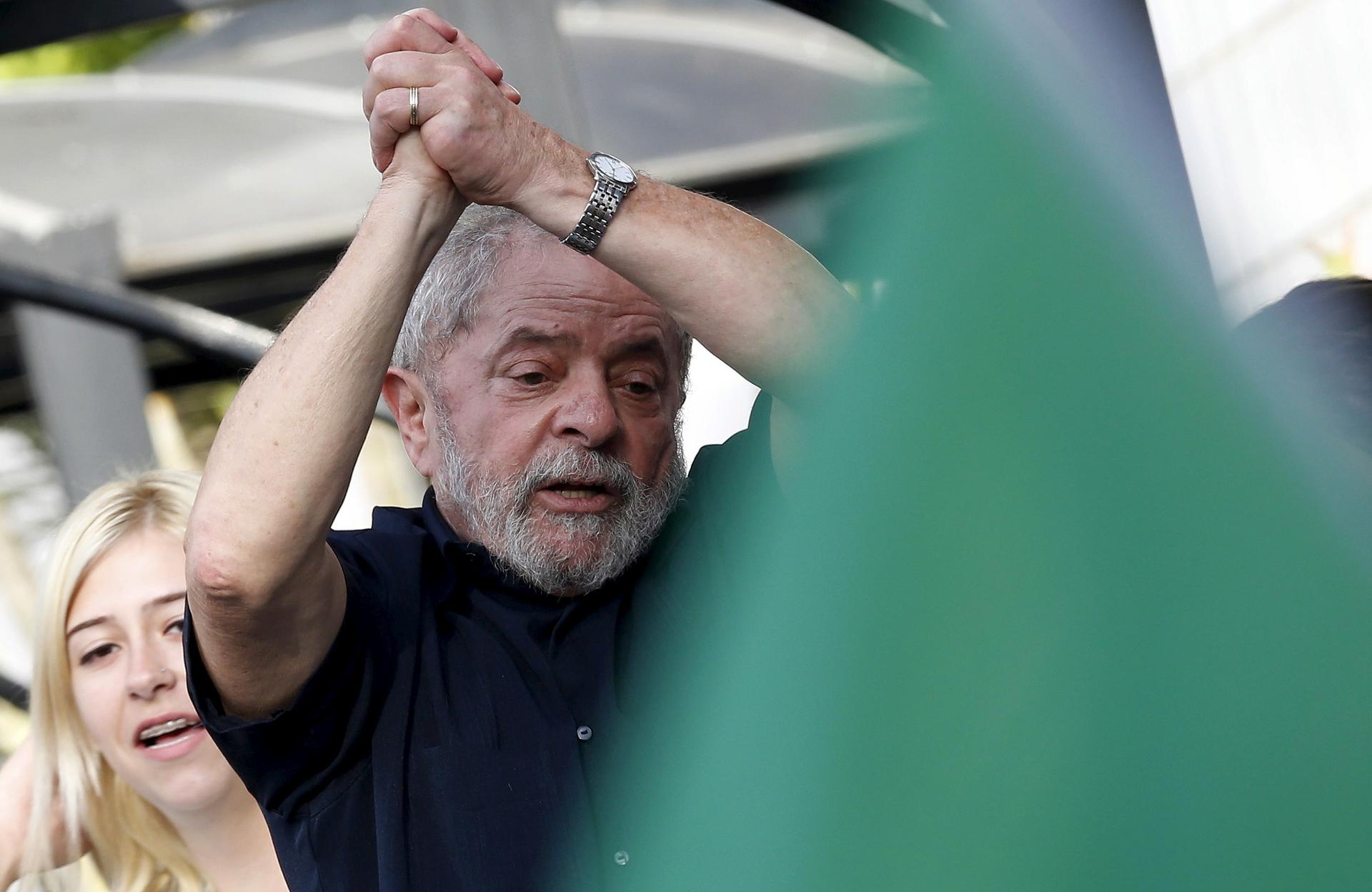Brazil’s ‘House of Cards’ continues as ex-president Lula is detained in anti-corruption probe
Former Brazil's President Luiz Inacio Lula da Silva waves to supporters as he arrives at his apartment building after being detained for questioning in a federal investigation of a bribery and money laundering scheme in Sao Paulo, Brazil, March 4, 2016.
Friday morning, Brazilian federal police arrived at the São Paulo home of former President Luiz Inácio "Lula" da Silva to detain him for three hours of questioning as part of the Lava Jato corruption probe.
Police searched Lula's home, son's home, and his foundation's headquarters for evidence that he benefitted personally from a bribery scheme run through Brazil's state oil company, Petrobras, from at least 2004 to 2012.
In the corruption scheme, construction companies inflated the budgets of refineries and other projects for the state oil company and kicked back money to politicians, black market money dealers and to themselves. "This great scheme was coordinated by the leadership of political parties that make the base of the federal government, especially the Worker's Party (PT), the Progressive Party (PP), and the Brazilian Democratic Movement Party (PMDB)," said a statement from Brazil's Federal Public Prosecutors, who direct the investigation.
Prosecutors said Lula received money from the Petrobras scheme via spending on a luxury apartment and vacation home, donations to his foundation and speaking fees.
Lula gave an impassioned press conference Friday afternoon denying wrongdoing and criticizing what he called a forceful detention. Pro- and anti-PT groups vocalized support and ire at the day's events on social media.
The Lava Jato task force, which has been overturning stones for almost two years, has investigated current and former politicians from at least six Brazilian political parties, including the opposition Brazilian Social Democratic Party (PSDB). But it has prioritized and drawn special media attention to wrongdoings of the ruling PT, says political scientist and State University of Rio professor Maurício Santoro.
"There are many good reasons to interrogate Lula," says Santoro. "The problem is with how it's being done. The judges leaked to the press the details of today's operation, in which police wore camouflage and carried rifles, and court testimony that was damaging to Lula was selectively leaked to a national magazine this week."
Under Brazilian law, police should not be able to detain someone for questioning without formally requesting first that the person testify, which did not happen in this case, says Santoro. To him, that shows "the justice system is being manipulated in a very strong partisan conflict in Brazil."
The head of Brazil's Federal Police has said in the past that Lava Jato is an investigation of facts, and not of specific people, and today prosecutor Carlos Fernando said no one was exempt from its reach. Meanwhile Sergio Moro, the judge presiding over the case, has written extensively about the Italian anti-mafia operation Mani Pulite (Clean Hands), in which he says press coverage of the investigations "guaranteed the support of public opinion for the judicial actions."
Analysts such as the Eurasia Group say that today's detention of Lula demonstrates the likelihood that President Dilma Rousseff won't finish her term. House speaker Eduardo Cunha, himself under investigation for receiving bribes, has filed impeachment charges against the president for irregularities in her 2014 budget. Were she impeached, Vice President Michel Temer of the PMDB would take office, or, depending on a court ruling, new elections could be called before the end of the next cycle.
"Temer has been making a very big effort to get close to the business community recently, calling for pro-market measures and opening Brazilian oil more to foreign exploration," says Santoro. "But some business leaders are also nervous about the problems you get when you buy Temer, who comes with Eduardo Cunha and the most divided Brazilian political party right now."
Rafaela Marques, a master's student in cultural studies at Rio's Federal Fluminense University, says "Brazilian democracy is regressing at this moment when the political discussion is reduced to pro- or anti- PT." Marques says it’s clear that reforms do need to happen in Brazil, principally divorcing money from politics and reforming the tax code and criminal justice system.
"But if Rousseff is impeached,” she continues, “I think the kind of changes that will happen in this country will be even worse for vulnerable populations than the current situation."
A previous version of this story mispelled Michel Temer's and Luiz Inácio "Lula" da Silva's names.
Every day, reporters and producers at The World are hard at work bringing you human-centered news from across the globe. But we can’t do it without you. We need your support to ensure we can continue this work for another year.
Make a gift today, and you’ll help us unlock a matching gift of $67,000!
